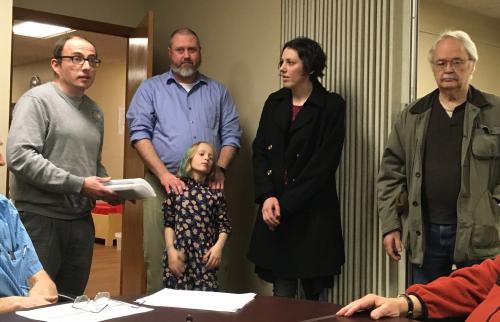University News
WIU Vector Biology Lab Honored by Local Health Department
February 15, 2018
MACOMB, IL – A Western Illinois University biology laboratory was recently honored by the McDonough County Health Department for assisting with West Nile Virus education and support through its research.
Assistant Professor Catherine Miller-Hunt, her husband, WIU doctoral student and local teacher Jason Hunt, and her father, David Miller, a retired WIU sociology and anthropology professor, were presented the award at a January Board of Health meeting.
The three worked with Western students through the Miller-Hunt Vector Biology Lab in Waggoner Hall to test more than 18,000 mosquitoes from the area for early detection of West Nile Virus. The Miller-Hunt Vector Biology Lab has conducted similar programs for numerous health departments in Western Illinois for several years.
"We are happy to be able to provide support to local health departments as they carry out mosquito collections and testing for West Nile Virus," said Miller-Hunt. "Our work is a collaboration of personnel and expertise that we hope continues for many years to come."
The award was presented by 2006 WIU alumnus Chris Adams, the McDonough County Health Department's Environmental Health director.
"By receiving early and accurate testing, this allows for residents within the county to become aware of mosquito borne disease activity and what they can do to protect themselves and their families," said Adams. "The working partnership that has been created with the WIU Miller-Hunt Lab and the McDonough County Health Department is a true example of 'What is Public Health.' The lab has created a program that allows (WIU) students to gain real research and professional experience that will help them to become better scientists."
Miller was also recognized for his mechanical support with repairing mosquito traps.
"As traps become damaged by other bugs or events while deployed, it becomes crucial to have them back up and running again," Adams said. "Through Dr. Miller's help, this can be possible and the traps do not have to be sent away for repair, which allows for better data collection."
For more information about the WIU Department of Biological Sciences and the programming it offers Western's students, visit wiu.edu/biology.
Posted By: Jodi Pospeschil (JK-Pospeschil@wiu.edu)
Office of University Communications & Marketing


Connect with us: